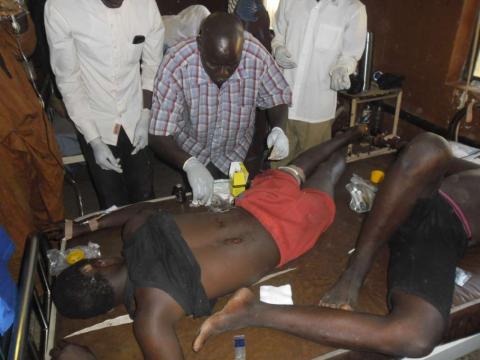Suicide bomber kills 48 students in Nigeria

© AP Photo/Adamu Adamu People are treated at the General hospital in Potiskum, Nigeria, Monday, Nov. 10, 2014, following a suicide bomb attack at Government Science Technical College Potiskum. Survivors say a suicide bomber disguised in a school uniform has detonated explosives at a high school assembly in northeast Nigeria, and a morgue worker says 48 students have been killed.
POTISKUM, Nigeria — Disguised in a school uniform, a suicide bomber set off explosives hidden in a backpack during an assembly Monday at a high school in northern Nigeria, killing at least 48 students and wounding 79 others.
It was the latest attack by suspected Boko Haram militants who kidnapped more than 200 schoolgirls earlier this year.
Soldiers rushed to the grisly scene, spattered with body parts, but were chased away by a stone-throwing crowd angry at the military's inability to halt a 5-year-old Islamic insurgency that has targeted schools and killed thousands.
The Islamic militants — whose name means "Western education is sinful" in the local Hausa language — have intensified the tempo and deadliness of attacks since the government announced last month that the group had agreed to a cease-fire and that the schoolgirls would be released imminently. Boko Haram's leader has denied any cease-fire deal and the girls have not been set free.
Monday's bombing came one week after a suicide attack in Potiskum, the capital of Yobe state, killed 30 people taking part in a religious procession by moderate Muslims.
Some 2,000 students had gathered for a weekly assembly at the Government Technical Science College when the explosion ripped through the school hall, survivors said.
"We were waiting for the principal to address us, around 7:30 a.m., when we heard a deafening sound and I was blown off my feet. People started screaming and running. I saw blood all over my body," 17-year-old student Musa Ibrahim Yahaya said from his hospital bed, where he was being treated for head wounds.
Survivors said the bomber hid the explosives in a type of backpack popular with students. Months ago Nigeria's military reported finding a bomb factory where explosives were being sewn into backpacks in the northern city of Kano.
Hospital records showed 48 bodies and many body parts were brought to the morgue. Seventy-nine students were admitted, many with serious injuries that may require amputations, health workers said. The hospital was so overcrowded that some patients were crammed two to a bed.
The victims all appeared to be between the ages of 11 and 20, a morgue attendant said.
The U.S. strongly condemned the attack.
"Our sympathies and thoughts are with the victims and their families of these latest egregious assaults on innocent civilians by those bent on fomenting violence, extremism and insecurity in northeastern Nigeria and the region," U.S. State Department spokeswoman Jen Psaki told reporters in Washington.
U.N. Secretary-General Ban Ki-moon strongly condemned the suicide bombing and expressed outrage at "the frequency and brutality of attacks against educational institutions in the north," U.N. deputy spokesman Farhan Haq said.
"These repeated and relentless attacks on children and schools are attacks on the future of Nigeria, a country that already has the largest number of children out of school in the world," UNICEF said.
Ban demanded an immediate halt to "these abominable crimes" and called for the perpetrators to be swiftly brought to justice and adequate security measures to protect civilians, Haq said.
The Yobe state government ordered the immediate closure of all government schools in the area.
Potiskum was once the home of one of Africa's biggest cattle markets and a booming grain market that attracted traders from neighboring countries before a state of emergency was declared in May 2013 in Yobe and two other northern Nigerian states, where Boko Haram has attacked schools and villages and driven hundreds of thousands from their homes in its fight to impose an Islamic state.
Gov. Ibrahim Gaidam said he was heartbroken by the loss of life during Monday's attack, and denounced the failure of emergency rule. "Instead of forcing insurgents and criminals to flee, the insurgents are forcing innocent people to flee and making life miserable," he said.
Nigerian President Goodluck Jonathan owes an urgent explanation to people living under a state of emergency while attacks increase, the governor said.
Garba Alhaji, the father of one of the wounded students, said the high school did not have proper security. "I strongly blame the Yobe state government for not fencing the school," he said, adding that just three months ago a bomb was discovered in the school and removed by an anti-bomb squad.
The government of Jonathan, who is running for re-election in February, has promised more security for schools.
Boko Haram attracted international outrage with the April kidnapping of 276 mostly Christian schoolgirls as they were taking exams at a boarding school in northern Nigeria. Dozens of the girls managed to escape, but 219 remain missing. Boko Haram has said that the girls have all converted to Islam and been married off to extremist fighters.
Many Nigerians are angry that Boko Haram has increased attacks and bombings since Oct. 17, when the government claimed to have brokered a cease-fire. Boko Haram leader Abubakar Shekau has denied negotiating a truce.
___
Faul reported from Johannesburg. Associated Press writer Ibrahim Abdulaziz contributed to this report from Yola, Nigeria.
